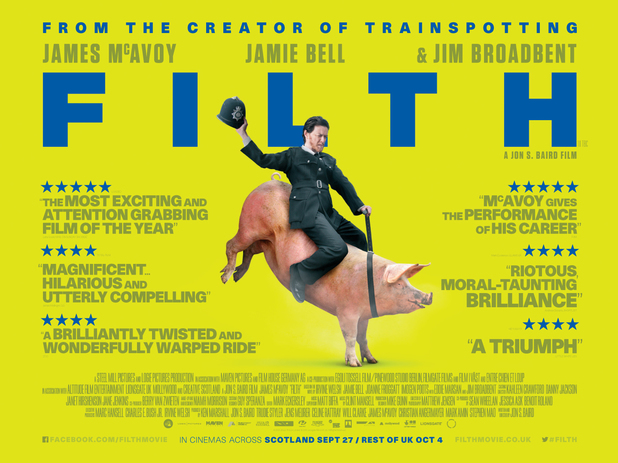Film review by: Michael Bonner
It has been a while since Danny Boyle’s Trainspotting. 20 years in fact. And since then there have been many films that tried to capture the loud, dirty and abhorrent nature of that classic. Many have tried and many have failed, including two Welsh adaptations, The Acid House and Ecstasy. But with Filth it seems that Jon S. Baird has broken this spell. And with a demonic James McAvoy at the helm, Filth may be bringing Welsh to a whole new audience. The film goes full steam ahead into the dark wit typical of Welsh. It sees MacAvoy’s Bruce Robertson snatch a balloon from a young kid and let it float away, blackmail an underage girl, frame his supposed ‘best friend’ for a crime that was his own, as well as many other twisted plots pitted against his co-workers in an attempt to secure a promotion. Baird keeps devilishly close to the original text, with only a few minor discrepancies, and although the aggressively satirical view of the police may appear slightly dated, it is definitely a contemporary piece of film.

The film itself is clever too; not only with its comedy, but with its structure and presentation. Much like Welsh’s command over structure and presentation in his books, Baird has brilliantly constructed a film that represents its main character’s struggle with his psychological issues, both through script and visual effects. The film cleverly begins with a disturbingly funny air to it, which slowly shifts into downright scary as the film progresses. The film appears to be a visual depiction of Bruce’s bipolar; one half comical, the other monstrous. And Baird couldn’t have picked a more brilliant actor for the role. McAvoy’s performance is astonishing. Unhindered by the need to be the pretty-boy hero, McAvoy has let loose with Inspector Sergeant Robertson. McAvoy appears more developed and seems to have learnt from roles such as Simon in Trance. However, unlike Simon where we buy into the nice guy fallen on hard times bit, we are, from the get go aware there is nothing to like about McAvoy’s Bruce; he is a sadistic monster and a bully. However, this, much like the sadistic nature of Trainspotting, is precisely why Filth works. If we suspend our disbelief and accept our anti-hero for 97 minutes, we can gain an insight into the issues the film tries to address: the current state of Scotland, police brutality, discrimination in the work place, as well as the mistreatment and mishandling of mental health in the UK. Baird does well to contain all the madness of Filth and his protagonist does equally well leading it, but the film wouldn’t be half as entertaining without its supporting cast. A rag bag bunch of police officers, doctors, accountants, friends and lovers, which includes Jamie Bell’s cocaine snorting Ray Lennox, a tape worm of a physiotherapist played by Jim Broadbent, as well as the only stable character of the film, Imogen Poots’ Amander Drummond, all come together to push the boundaries of British cinema beyond its limits.
With a strong narrative, a few nice twists and turns and lots of subtle intricacies, Filth is definitely on par with the British satire elite. And McAvoy’s demonic performance may not secure D.S Robertson’s promotion but will definitely secure his position alongside Malcolm McDowell’s Alex DeLarge and Tom Hardy’s Charles Bronson in the hall great British sociopaths. Over all Filth is well deserved of an 8 out of 10.

